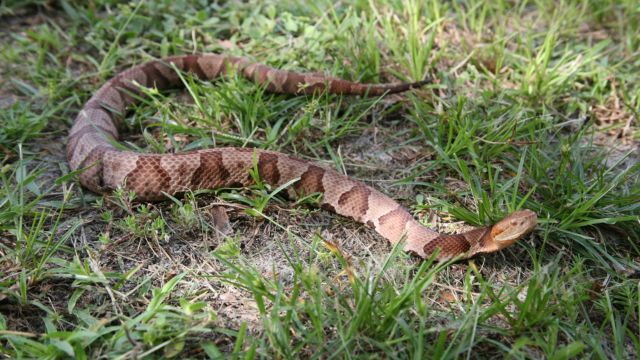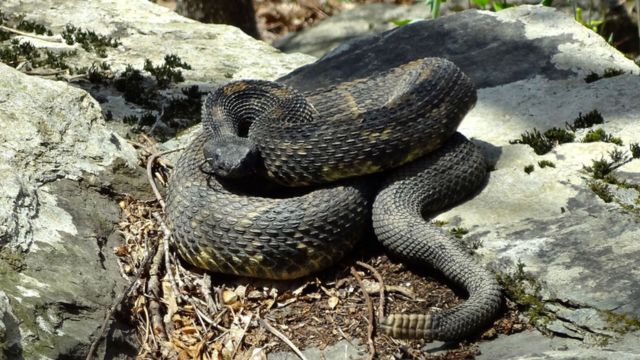Tennessee is a stunning state with a variety of landscapes, but it is also home to a number of poisonous snake species.
You can enjoy the outdoors in a safe manner if you are aware of these animals. Let’s examine some of the poisonous snakes that can be found in the Volunteer State.
Western Cottonmouth
Located on the northern Highland Rim in west Tennessee, these poisonous vipers come in a variety of colors. Some have an olive tint, while others are dark brown.
Although they have dark bands all over their body, it can be difficult to see them because they blend in with the rest of the body. Western cottonmouths have a white upper lip on a brown head.
This subspecies, which is around three feet long on average, prefers damp areas like as lakes, rivers, drainage ditches, swamps, and wetlands. They may be swimming in the water, tanning on the bank, or even on the beach.
Southern Copperhead
Southern Copperheads are primarily found in western Tennessee, despite their name. They are frequently seen on steep, forested hillsides where they might take up residence beneath logs, rocks, or leaves.

They also tend to avoid open spaces, favoring the cover of the forest. Despite their shyness, these snakes have been observed close to wetlands and streams and can still enter cities. Mice, tiny birds, lizards, snakes, amphibians, and insects are among their food sources.
Southern Copperheads are most active in the spring and fall, so keep a look out for them. They are mating at these times of year, and it is common for the males to engage in violent combat, striking at each other with the front of their bodies.
Read Also: Top 10 Cities Where Raising a Family Will Cost You the Most
Western Pygmy Rattlesnake
In addition to being short in stature, western pygmy rattlesnakes have a tiny rattle that makes a faint, indiscernible buzzing sound. From Stewart County to the southern boundary of the state, these rattlers can be found along Tennessee’s western Highland Rim.
The western pygmy rattlesnake is a good swimmer and like to be near water, just like their larger cousins. They can be found in woodlands, glades, wetlands, marshes, and floodplains. They consume small snakes, frogs, lizards, amphibians, and rodents.
Timber Rattlesnake
They are widespread in Tennessee and might be difficult to spot due to their wide range of colors. They might be tan, brown, pink, or black, although they are usually yellowish-brown or gray.

They have a rust-colored stripe along the back and chevron-shaped bands all over their body. The rattle at the end of the tail, the triangular head, and the vertical pupils are some indicators that it’s a rattlesnake.
In order to receive sunlight, timber rattlesnakes favor wooded areas and mountains with rocky slopes that face south. In addition to marshes, thickets, wooded streams, boulders, and logs, they can be found on bluffs or cliffs. They consume small mammals like squirrels, birds, lizards, and rodents.
Read Also: Three Orlando Cities Giving Away Free Land to People
Northern Copperhead
Its Northern cousin is found across the state of Tennessee, whereas the Southern Copperhead is found in western Tennessee.
The patterns, coloring (with slightly deeper, chestnut-brown crossbands), nutrition, and behaviors of this pit viper, also known as Agkistrodon contortrix mokasen, are comparable to those of the Southern subspecies.
It can be up to four feet long, making it a large snake as well.
Copperheads will tense up, lift their heads, and vibrate their tails when they feel threatened, startled, or disturbed. Remain composed if you see a copperhead acting in this manner.
Take your time moving away from the snake, and don’t make any loud noises or abrupt movements.
Final Thought
You may reduce interactions and stay safe while enjoying Tennessee’s great outdoors by being aware of the behaviors and habitats of these poisonous snakes. Keep in mind that it’s best to observe these animals from a distance and refrain from upsetting them.
It’s crucial to maintain your composure and take your time backing away from a poisonous snake. If you have been bitten by a snake, get medical help right away.




